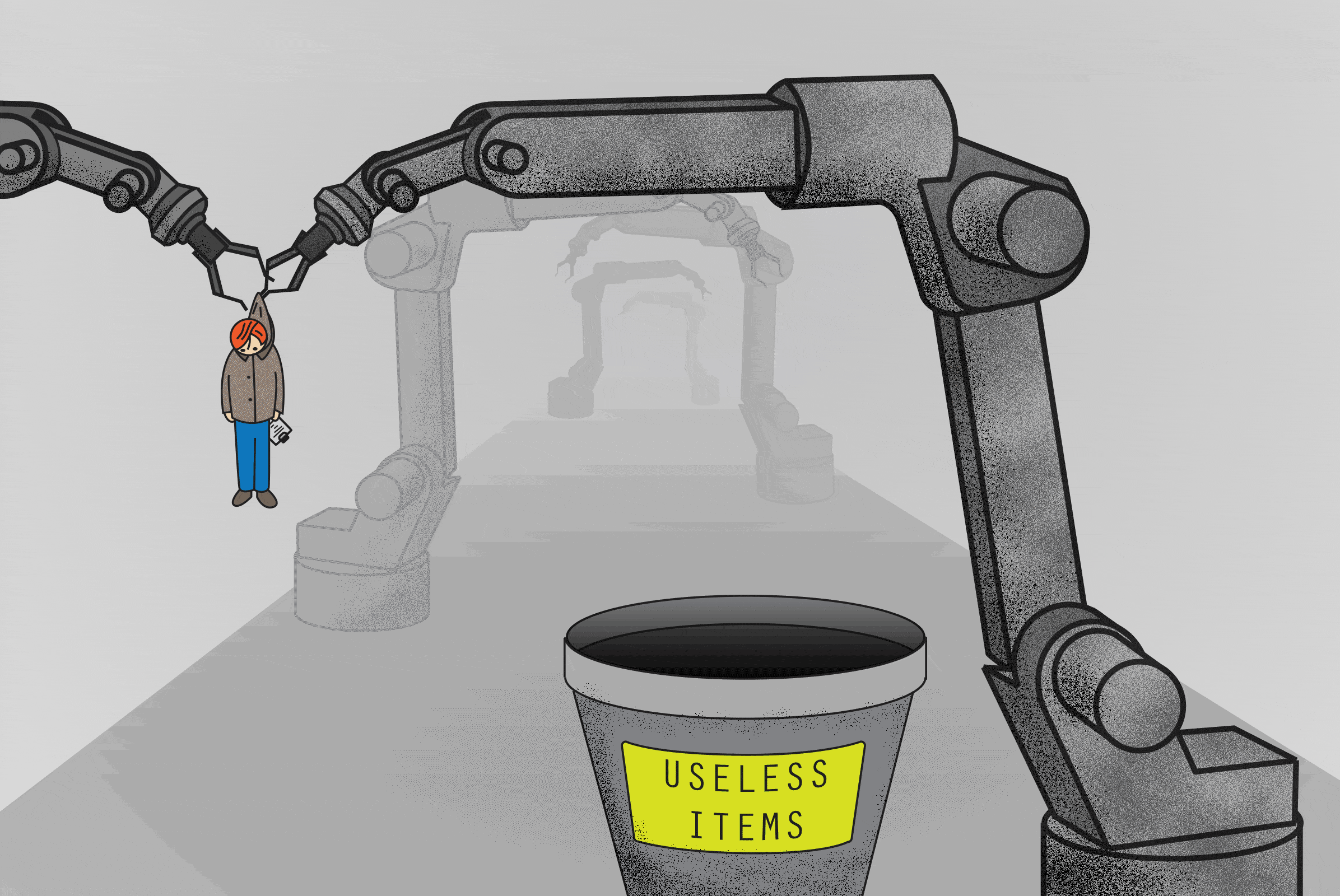Artificial intelligence: These Jobs Are Bound To disappear
will AI take my job, jobs AI will replace, future of work AI, automation job loss, AI job displacement, careers at risk of AI, AI replacing jobs, automation in industries, AI and employment, future-proofing careers

Category: AI & Automation, Future of Work, Job Market Trends, Technology & Innovation
Artificial Intelligence: Which Jobs Are Bound to Disappear?
Introduction: How AI is Reshaping the Workforce
Artificial Intelligence (AI) is transforming industries at an unprecedented pace. From automation in manufacturing to AI-powered customer service, the shift is inevitable. But which jobs are most at risk? Who will be affected the most? And how can professionals adapt to this new reality?
Why Will AI Replace Jobs?
According to the OECD, 14% of jobs are easily automatable, while 32% will undergo significant transformations due to AI. The most vulnerable occupations involve repetitive, rule-based tasks that machines can execute more efficiently and accurately than humans. The McKinsey Global Institute estimates that automation could displace 400 to 800 million jobs globally by 2030.
What Jobs Are Most at Risk?
1. Manufacturing & Industrial Labor
- Robots in factories have been replacing assembly line workers for decades. AI-driven automation is expected to continue eliminating these jobs.
- Predictive maintenance systems reduce the need for human monitoring of machinery.
2. Retail & Cashier Positions
- Self-checkout kiosks and AI-powered e-commerce platforms are rapidly reducing demand for cashiers.
- Amazon Go-style stores with AI-driven inventory and customer tracking are eliminating the need for traditional retail staff.
3. Transportation & Delivery Services
- Self-driving vehicles and AI logistics optimization threaten millions of jobs in trucking and delivery services.
- Companies like Tesla, Waymo, and Uber are already developing autonomous transport systems.
4. Administrative & Data Entry Roles
- AI chatbots and virtual assistants can now handle scheduling, customer service, and administrative tasks.
- Automated data processing software replaces traditional data entry clerks.
5. Banking & Financial Services
- AI algorithms in trading and risk management reduce reliance on financial analysts.
- Automated loan processing and robo-advisors are replacing banking professionals.
6. Customer Service & Call Centers
- AI-driven chatbots and voice assistants are handling an increasing volume of customer interactions.
- Natural Language Processing (NLP) enables AI to engage in human-like conversations, reducing the need for human agents.
Who Will Be Most Affected?
1. Low-Skilled Workers
Industries with a high concentration of routine-based jobs, such as retail and manufacturing, are seeing the highest levels of displacement.
2. Senior Professionals
Older workers may struggle to adapt to new AI-driven tools and work environments, making reskilling a critical necessity.
3. Entry-Level Employees
Routine tasks typically assigned to interns or junior employees (e.g., legal research, data analysis) are increasingly automated.
When Will These Changes Happen?
The impact of AI on jobs is already happening. By 2030, experts predict that nearly one-third of current jobs will either be fully automated or transformed beyond recognition.
How Can Workers Adapt?
1. Upskilling & Reskilling
- AI and tech literacy will become essential for job security.
- Learning data analysis, programming, and digital marketing can help professionals stay relevant.
2. Transitioning to AI-Supported Roles
- AI will create new jobs in robot maintenance, AI ethics, and cybersecurity.
- Hybrid jobs combining human expertise with AI capabilities will emerge.
3. Exploring Human-Centric Careers
- Creative fields (writing, arts, marketing) and emotional intelligence-driven roles (therapists, teachers, social workers) are less likely to be automated.
- AI struggles with tasks requiring deep empathy, intuition, and complex problem-solving.
Will AI Create More Jobs Than It Destroys?
Despite concerns about job loss, AI is expected to generate new job opportunities in emerging fields. A report by the World Economic Forum (WEF) predicts that AI will create 97 million new jobs by 2025, surpassing the number of displaced roles.
Conclusion: The Future of Work in the AI Era
While AI is set to disrupt multiple industries, it also offers opportunities for innovation and new career paths. Professionals must embrace lifelong learning, digital transformation, and adaptability to stay ahead in this rapidly evolving job market.
Related Topics:
- Green Economy: AI’s Role in Sustainability & Job Creation
- How AI is Reshaping Healthcare & Medical Professions
- The Rise of AI Ethics & Human-AI Collaboration
Sources:
- OECD (2018)
- McKinsey Global Institute (2021)
- World Economic Forum (2020)
Tags: AI job loss, automation replacing jobs, AI in the workforce, future careers AI, job displacement AI, how to adapt to AI, AI employment trends, jobs at risk automation, AI technology impact, AI-proof careers
Related posts
The Future of Work: How AI is Reshaping Careers
Automation vs Employment: Will Robots Replace Human Workers?
How AI and Machine Learning Are Changing the Job Market
Top 10 Jobs AI Will Replace by 2030
Industries Most at Risk of AI Disruption
The Role of AI in Modern Business Operations
AI and the Workforce: How to Adapt to Automation
AI-Powered Jobs: New Opportunities in a Tech-Driven Economy
Will AI Create More Jobs Than It Destroys?
The Ethical Debate: Should AI Replace Human Workers?
AI and Remote Work: How Technology is Shaping the Future of Jobs
The Gig Economy in the Age of AI
How Businesses Are Using AI to Improve Efficiency
AI in Customer Support: The End of Call Centers?
AI and Job Security: Who is Most at Risk?
AI in Healthcare: Job Loss or New Career Paths?
The Evolution of AI in the Legal Industry
From Warehouse to Delivery: How AI is Changing Logistics Jobs
Can AI Replace Creative Jobs? The Future of Art, Writing, and Design
The Impact of AI on Freelancers and Independent Contractors
How AI is Changing the Hiring Process in HR
The Rise of AI Chatbots and Their Effect on Customer Service Jobs
AI and Job Creation: The Truth Behind the Myths
The Countries Leading in AI Job Market Growth
AI and Blue-Collar Jobs: Is the Industrial Sector Safe?
How Governments Are Responding to AI Job Displacement
The Impact of AI on Marketing Careers
The Role of AI in Journalism and News Reporting
AI in Financial Services: Threat or Opportunity for Professionals?
AI and Startups: How Entrepreneurs Are Leveraging Automation
How AI is Transforming E-commerce and Retail Jobs
The Role of AI in Data Analysis and Market Research
Preparing for an AI-Dominated Future: Skills You Need to Learn
The Social Impact of AI Job Displacement
AI in Education: Will Teachers Be Replaced?
The Connection Between AI and the Green Economy
AI and the Restaurant Industry: Will Robots Replace Chefs?
The Impact of AI on the Film and Entertainment Industry
How AI is Influencing Corporate Decision-Making
AI and the Future of Engineering Jobs
The Role of AI in Scientific Research and Innovation
AI in Real Estate: How Technology is Changing the Housing Market
How AI is Transforming Law Enforcement and Security Jobs
The Ethics of AI in Hiring and Recruitment
AI and the Rise of Smart Cities: Job Opportunities and Challenges
How AI is Used in Space Exploration and Its Impact on Careers
The Relationship Between AI, Blockchain, and the Future of Work
How AI is Transforming Mental Health and Therapy Jobs
The Role of AI in Agriculture: Automation in Farming
AI in the Automotive Industry: Self-Driving Cars and Job Disruptions
